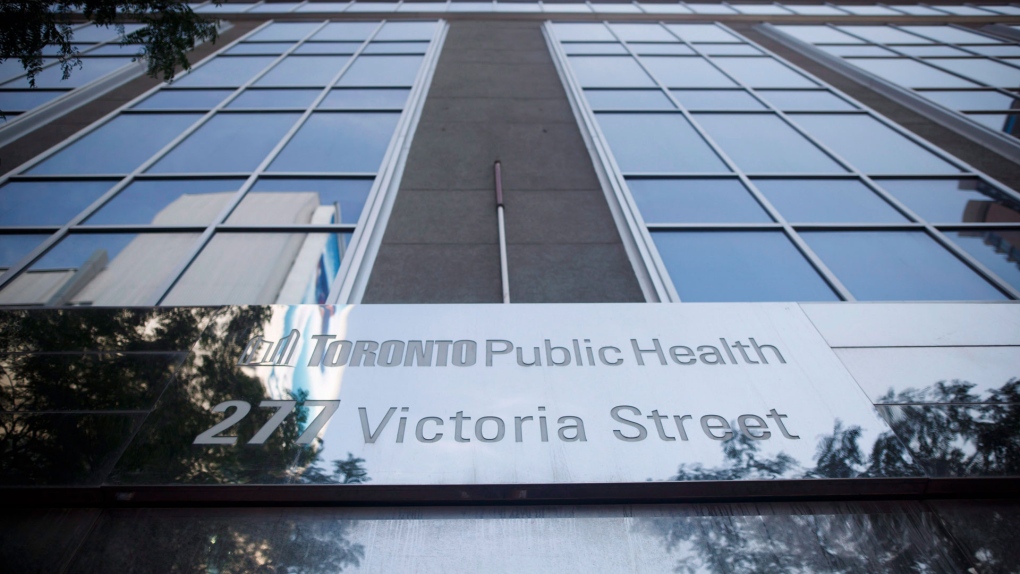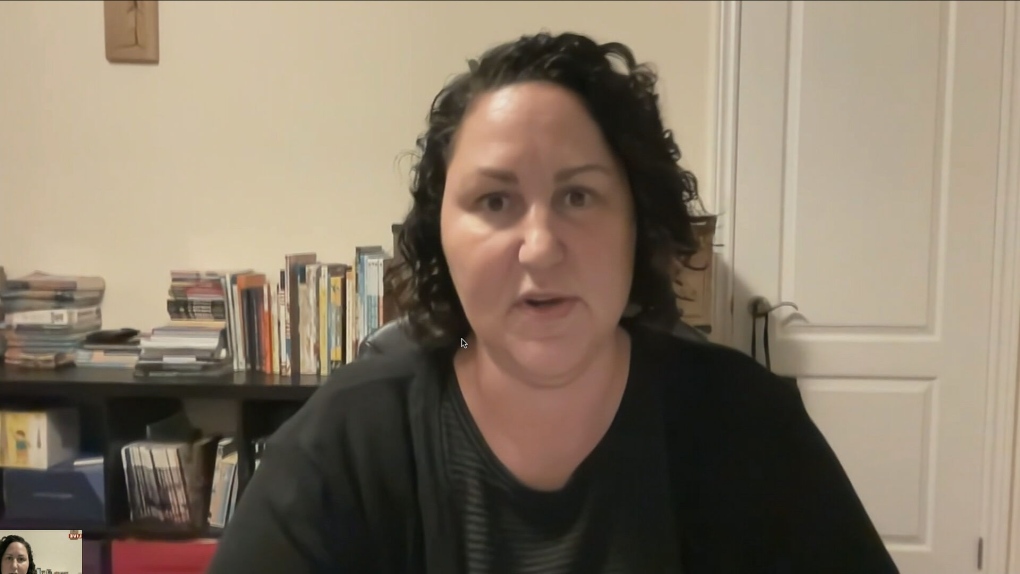Toronto reports third cluster of fatal drug overdoses since late February
 In this Oct. 22, 2018 file photo, a fentanyl user holds a needle in Philadelphia. (David Maialetti/The Philadelphia Inquirer via AP, File)
In this Oct. 22, 2018 file photo, a fentanyl user holds a needle in Philadelphia. (David Maialetti/The Philadelphia Inquirer via AP, File)
Toronto is seeing an increasingly deadly trend as paramedics continue to attend to a higher-than-usual number of suspected drug overdose deaths.
On Wednesday, Toronto Public Health (TPH) reported that between March 23 and 26 seven people are believed to have died of a drug overdose in the city.
Earlier this month, the health unit issued an alert after six people fatally overdosed between March 14 and 17. These deaths are triple the average seen over a four-day period in the last three months.
Another six people died of a suspected drug overdose between Feb. 24 and 27, TPH said.
These suspected drug overdose deaths occurred throughout the city.
And while it is not known exactly what drugs are to blame, public health is saying that the “significantly worsening contamination and unpredictability of the unregulated opioid supply” are key factors.
Toronto Public Health pointed to some of the recent trends it has seen, notably an increase in the contamination of expected fentanyl samples due to high-potency opioids, benzodiazepine-related drugs, and veterinary tranquillizers as well as higher-than-usual concentrations of fentanyl being found in expected fentanyl samples.
It also said that there’s also been a higher presence of nitazene opioids found in samples of unregulated/non-prescribed oxycodone (OxyContin), hydromorphone (Dilaudid), hydrocodone, and Percocet.
Since late 2023, Toronto’s Drug Checking Services, a free and anonymous public health service offered at five harm reduction agencies in the downtown core, has identified three new highly-potent substances in the unregulated street drug supply.
The first, medetomidine/dexmedetomidine, are two long-acting tranquillizers that produce a greater sedation than other similar substances like xylazine, which is also known as “tranq,” “tranq dope,” or “horse tranquilizer.” The effects of these drugs cannot be reversed with the overdose-reversing medication, naloxone, as they are not opioids.
The service has also detected two kinds of nitazene opoids: N-desethyl etonitazene, which is considered to be up to 10 times stronger than fentanyl, and protonitazepyne, which is believed to be more than 20 times stronger than fentanyl. These drugs both require a greater dose of naloxone to reverse their negative effects.

Drug alerts issued with a “lot of intention,” says TPH
During a follow-up interview with CP24.com, Associate Medical Officer of Health Dr. Shovita Padhi said they put in a lot of thought and deliberation before issuing a drug alert.
“When we do put one out, it’s serious. It’s done with a lot of intention,” she said.
Padhi said that this latest alert was issued because the number of suspected overdose deaths recently seen is double the four-day average.
She also said that the suspected fatal overdoses are especially concerning as they happened throughout the city.
“It’s not just a downtown phenomenon,” Padhi said, adding many of those who recently died of a drug overdose were also found in their home.
She also said that TPH was motivated to issue an alert due to the recent discovery of highly-potent nitazene opioids in the unregulated supply, which she said is “especially concerning” to TPH.
“If your body cannot handle that level of opioid, you’re at an extremely high risk of overdosing and dying,” Padhi said, adding the increasingly unpredictability of Toronto's street drugs is also a key factor.
“There’s no way for people who use drugs to control their intake.”
Padhi went on to say that addressing the drug crisis complex and requires a “variety of solutions.”
“We need a public health approach that includes everything from prevention to harm reduction and treatment services across the continuum of care,” she said, adding Toronto is constantly struggling to offer supports to people who use drugs throughout the city.
No end in sight to toxic drug crisis: researcher
Gillian Kolla, a public health researcher whose work focuses on substance abuse, said that this recent spate of suspected overdose deaths in Toronto demonstrates that there's no end in sight to Canada’s ongoing toxic drug crisis.
“We’re going to be continuing to have these clusters of overdose deaths because we’re doing the absolute bare minimum to address ths crisis,” she told CP24.com on Thursday.
“It doesn’t have to be this way. … This is a crisis. We need more support.”
An assistant professor at Memorial University’s Faculty of Medicine, Kolla said that the government, specifically the province, must immediately fund and open more supervised consumption services as well as safer supply programs, among other things, to start getting a handle on this crisis.
The need is so great, she said, that several supervised consumption programs in Ontario have recently had to close their doors or are facing imminent closure due to not enough funding.
According to the Public Health Agency of Canada (PHAC), on average 22 people died every day of a drug overdose between January and September 2023. Eight of those deaths happened daily during that same time frame in Ontario.
The latest PHAC data from 2022 showed that in Ontario a total of 2,531 people died of opioid toxicity. So far, preliminary data from the first nine months of 2023 point to a similar trend.
These numbers are a sharp contrast to those of 2017, where 1,265 drug overdose deaths were recorded in the province.
“The very big danger right now is that we’re going to normalize this very high level of deaths,” said Kolla, who also keeps a close eye on the types of substances that are circulating in the ever-changing unregulated drug supply.
She said the major challenge is the inability to control what’s out there.
“I call it the chocolate chip cookie effect. You never know what you’re going to get. It’s the volatility of the supply that is the issue,” Kolla said, noting the supply has been increasingly unpredictable since 2017 when fentanyl replaced heroin as the most widely used street drug.
“It’s a kitchen sink of different chemicals. … This is happening so far up the supply chain that people have no control of it. Nobody wants to be killing their customers.”

Tips for those who consume unregulated drugs
As always, people who use drugs are advised to not use alone and if they must, have a safety plan in place that includes carrying naloxone and letting someone know before they consume.
The best bet is to buddy up with someone you trust, do small test dose first, and visit a supervised consumption service, if possible.
It’s a good rule of thumb to check your drugs, ideally before using them.
People who use drugs are also encouraged to talk to the person they got them from, if the sample did not contain what was expected, or get their drugs from another source.
CTVNews.ca Top Stories

Donald Trump says Canada becoming 51st U.S. state 'a great idea'
U.S. President-elect Donald Trump is taking aim at Canada once more, saying it would be 'a great idea' to make it America's ‘51st state.'
After scamming their victims, some con artists go on to scam our courts with impunity
Convicts, including fraudsters, are skipping out on their court-ordered payments to their victims to the tune of tens of millions of dollars across the country, according to figures obtained by CTV W5.
There are 88 new Order of Canada appointees. Here's a look at some of the most notable names
Ryan Reynolds, Scott Oake and Maureen Ann Jennings are among the 88 new recipients of the Order of Canada.
Synagogue on Montreal's West Island targeted by alleged arson
A synagogue on Montreal's West Island was the target of an alleged arson attack.
Canadians return to Canada Post with relief -- and shakier faith in the service
Canada Post trucks, conveyors and mail carriers swung back into motion Tuesday after a month-long strike by more than 55,000 postal workers left letters and parcels in limbo and a massive backlog to sort through.
'You're either with Beijing or you're with Washington': Ford says to Mexico in CNN interview
Ontario Premier Doug Ford has a message for Mexico as the threat of tariffs by incoming president Donald Trump hangs over both sides of the U.S. border.
NEW These seniors were hit by the affordability crisis in a different way. They're having to support their children and grandchildren
With the high cost of living increasingly a concern, some seniors are making sacrifices to help their adult children and grandchildren make ends meet. Here are some of their stories.
Restaurants that charge tax during holiday break could get investigated by CRA: industry expert
Restaurants that fail to honour the holiday tax break could be investigated by the Canada Revenue Tax Agency, according to the Ontario Restaurant Hotel and Motel Association.
Quebec man pleads guilty to spreading hate speech about Jews, trying to make 3D-printed guns
A Quebec man has pleaded guilty to attempting to manufacture multiple firearms with a 3D printer, including an AR-15, and spreading hate speech about the Jewish community.

































